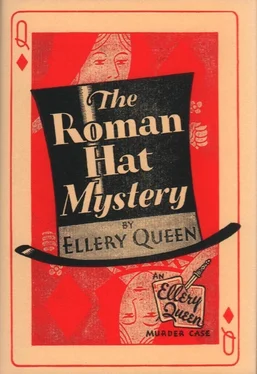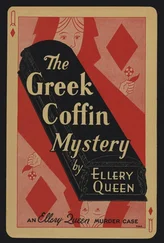Then the owner of the hand did a surprising thing. With a fierce bunching of muscles he sprang from the bench and leaped backward, away from the first man. At the same time he leveled his right hand straight at the crouched frozen figure. And a fragmentary gleam of light from an arc lamp far off revealed the thing he held in his hand — a revolver.
Crying out hoarsely, the first man sprang to his feet with the agility of a cat. His hand plunged with a lightninglike movement into his overcoat pocket. He darted, reckless of the weapon pointed at his heart, straight forward at the tense figure before him.
But things were happening. The peaceful tableau, so suggestive a bare instant before of open spaces and dark country silence, was transformed magically into a scene of intense activity — a writhing, yelling pandemonium. From a cluster of bushes a few feet behind the bench a swiftly moving group of men with drawn guns materialized. At the same time, from the farther side of the walk, a similar group appeared, running toward the pair. And from both ends of the walk — from the entrance about a hundred feet away and from the opposite direction, in the blackness of the Park — came several uniformed policemen, brandishing revolvers. The groups converged almost as one.
The man who had drawn his gun and leaped from the bench did not await the arrival of reinforcements. As his companion of a moment before plunged his hand into his coat pocket the gun-wielder took careful aim and fired. The weapon roared, awakening echoes in the Park. An orange flame streaked into the body of the black-coated man. He lurched forward, clutching his shoulder spasmodically. His knees buckled and he fell to the stone walk. His hand still fumbled in his coat.
But an avalanche of men’s bodies kept him from whatever furious purpose was in his mind. Ungentle fingers gripped his arms and pinned them down, so that he could not withdraw his hand from his pocket. They held him in this way, silently, until a crisp voice behind them said, “Careful, boys — watch his hands!”
Inspector Richard Queen wriggled into the hard-breathing group and stood contemplatively above the writhing figure on the pavement.
“Take his hand out, Velie — easy, now! Hold it stiff, and — stiff, man stiff! He’d jab you in a flash!”
Sergeant Thomas Velie, who was straining at the arm, gingerly pulled it from the pocket despite the violent flounderings of the man’s body. The hand appeared — empty, muscles loosened at the last moment. Two men promptly fastened it in a vise.
Velie made a movement as if to explore the pocket. The Inspector stopped him with a sharp word and himself bent over the threshing man on the walk.
Carefully, delicately, as if his life depended upon caution, the old man lowered his hand into the pocket and felt about its exterior. He gripped something and just as cautiously withdrew it, holding it up to the light.
It was a hypodermic needle. The light of the arc lamp made its pale limpid contents sparkle.
Inspector Queen grinned as he knelt by the wounded man’s side. He jerked off the black felt hat.
“Disguised and everything,” he murmured.
He snatched at the gray mustache, passed his hand rapidly over the man’s lined face. A smudge immediately appeared on the skin.
“Well, well!” said the Inspector softly, as the man’s feverish eyes glared up at him. “Happy to meet you again, Mr. Stephen Barry, and your good friend, Mr. Tetra Ethyl Lead!”
Inspector Queen sat at the writing desk in his living room scribbling industriously on a long narrow sheet of notepaper headed THE QUEENS.
It was Wednesday morning — a fair Wednesday morning, with the sun streaming into the room through the dormer windows and the cheerful noises of 87th Street faintly audible from the pavements below. The Inspector wore his dressing gown and slippers. Djuna was busy at the table clearing away the breakfast dishes.
The old man had written:
DEAR SON: As I wired you late last night, the case is finished. We got Stephen Barry very nicely by using Michaels’ name and handwriting as bait. I really ought to congratulate myself on the psychological soundness of the plan. Barry was desperate and like so many other criminals thought he could duplicate his crime without being caught.
I hate to tell you how tired I am and how unsatisfying spiritually the job of man-hunter is sometimes. When I think of that poor lovely little girl Frances, having to face the world as the sweetheart of a murderer... Well, El, there’s little justice and certainly no mercy in this world. And, of course, I’m more or less responsible for her shame... Yet Ives-Pope himself was quite decent a while ago when he telephoned me on hearing the news. I suppose in one way I did him and Frances a service. We—
The doorbell rang and Djuna, drying his hands hastily on a kitchen towel, ran to the door. District Attorney Sampson and Timothy Cronin walked in — excited, happy, both talking at once. Queen rose, covering the sheet of paper with a blotter.
“Q, old man!” cried Sampson, extending both hands. “My congratulations! Have you seen the papers this morning?”
“Glory to Columbus!” grinned Cronin, holding up a newspaper on which in screaming headlines New York was apprised of the capture of Stephen Barry. The Inspector’s photograph was displayed prominently and a rhapsodic story captioned “Queen Adds Another Laurel!” ran two full columns of type down the sheet.
The Inspector, however, seemed singularly unimpressed. He waved his visitors to chairs, and called for coffee, and began to talk about a projected change in the personnel of one of the city departments as if the Field case interested him not at all.
“Here, here!” growled Sampson. “What’s the matter with you? You ought to be throwing out your chest, Q. You act as if you’d pulled a dud rather than succeeded.”
“It’s not that, Henry,” said the Inspector with a sigh. “I just can’t seem to be enthusiastic about anything when Ellery isn’t by my side. By jingo, I wish he were here instead of in those blamed Maine woods!”
The two men laughed. Djuna served the coffee and for a time the Inspector was too occupied with his pastry to brood. Over his cigarette Cronin remarked: “I for one merely dropped in to pay my respects, Inspector, but I’m curious about some aspects of this case... I don’t know much about the investigation as a whole, except what Sampson told me on the way up.”
“I’m rather at sea myself, Q,” put in the District Attorney. “I imagine you have a story to tell us. Let’s have it!”
Inspector Queen smiled sadly. “To save my own face I’ll have to relate it as if I did most of the work. As a matter of fact, the only really intelligent work in the whole sordid business was Ellery’s. He’s a sharp lad, that son of mine.”
Sampson and Cronin relaxed as the Inspector took some snuff and settled back in his armchair. Djuna folded himself quietly in a corner, ears cocked.
“In going over the Field case,” began the Inspector, “I will have to refer at times to Benjamin Morgan, who is really the most innocent victim of all.* I want you to bear in mind, Henry, that whatever I say about Morgan is to go no further, either professionally or socially. I already have Tim’s assurance of silence...”
Both men nodded wordlessly. The Inspector continued:
“I needn’t explain that most investigations of crime begin with a search for the motive. Many times you can discard suspect after suspect when you know the reason behind the crime. In this case the motive was obscure for a long time. There were certain indications, like Benjamin Morgan’s story, but these were inconclusive. Morgan had been blackmailed by Field for years — a part of Field’s activities of which you gentlemen were ignorant, despite your knowledge of his other social habits. This seemed to point to blackmail as a possible motive — or rather the choking off of blackmail. But then any number of things could have been the motive — revenge, by some criminal whom Field had been instrumental in ‘sending up.’ Or by a member of his criminal organization. Field had a host of enemies, and undoubtedly a host of friends who were friends only because Field held the whip-hand. Any one of scores of people — men and women both — might have had a motive for killing the lawyer. So that, since we had so many other pressing and immediate things to think about and do that night at the Roman Theatre, we did not bother much with motive. It was always in the background, waiting to be called into service.”
Читать дальше












